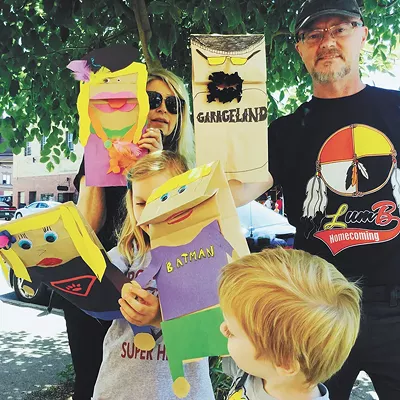My first brush with Catholic guilt came at my first confessional. Inside a wooden box, I got down on both knees, closed my eyes, entwined my fingers in prayer and said, "Bless me Father, for I have sinned. This is my first confession."
I confessed I was mean to my older brother and disobeyed my parents. I think I was 8. It was a confession my mother prompted me to say and my repentance was overcome by a handful of Hail Marys and Our Fathers.
I haven't confessed since.
In later years, the guilt was personified by my grandmother — the patron saint of unnecessary rituals. At times in my life she has rubbed the back of my ears with holy water because she "knows that I have sinned."
My aunts take preventative measures and simply mix holy water into their perfume bottles. At Christmas we make a cake for Jesus and the family sings "Happy Birthday" in unison. We joke about the backpack my grandmother has ready for the end of the world and assume it's full of stale Easter candy, Listerine — God's cure for everything — and pastel-colored rosaries.
The Catholic Church, and my family's admittedly unusual interpretation of its readings, taught me that we are inherently sinful. Although I came out as an atheist in my teens, what the zeitgeist calls "Catholic guilt" still haunts me.
I blush when I see my name on the church bulletin board, when my mother's congregation prays for me, and when she lights a candle in my honor in the sanctuary.
I twitch in the pew at Midnight Mass each year I make the snowy trek home for Christmas, and I shrink my shoulders when my mother bluntly suggests that my boyfriend left me, and my car broke down, and my cat almost died this year, because I don't have faith — because I don't pray.
My grandmother gifted me exorcism salt for my pink apartment in Browne's Addition. She wanted me and my boyfriend at the time to be protected by the divinity, "although we were living in sin."
I've moved into new apartments and across state lines with the bag of salt just in case. In case she is right and I am wrong. In case, for some reason, I need it.
The older I get, the more abstract the guilt becomes. I feel guilty for not believing in the hocus-pocus of demons and arks and burning in eternal hell. I feel the guilt of baptismal water wasted on my forehead as an infant, of countless matching Easter dresses my mother made for the two of us by hand, and for wordless whispers others sent up to their God on my behalf.
I am ashamed to feel the weight of a belief system that teaches to be human — mortal, of flesh and blood — is to be flawed. Because for the most part, I don't feel flawed.
This has been the worst year of my young life, but I refuse to take all of the blame. I am weak and vulnerable and I will die, but my passions — my lust and wants and needs — are not sinful to me.
And the fragility that I see each day in the mirror only makes me stronger.
I am happy to be of this body, this earth. I don't want forgiveness for trespassing across imaginary lines or this suffocating guilt.
I threw away the exorcism salt. I tossed the blue, crushed-velvet bag and container of holy water into the trash, half expecting to be possessed by a demon — or at least struck by lightning.
Nothing happened.
I wondered how a little bag of salt could cause so much anxiety and guilt even when tucked inside kitchen cupboards and linen closets all these years.
I realized that keeping the salt was some form of recognition that I am or have the potential for evil. That I am bad and deserving of every heartache and stitch of bad luck. And I'm not.
No amount of water — blessed as it may be — holy book or backpack will keep me from the end of the world. No amount of salt will protect me.
I'm OK with that. ♦



















